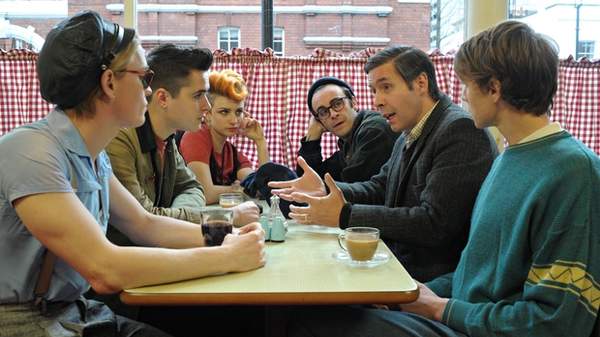Overview
Out-and-proud gay activists on a crusade to support small town coal miners might seem like an implausible subject for a film and I'd agree if it wasn't for the fact Pride is based on a true story.
It's 1984 and Britain is under the control of Margaret Thatcher who is in full assault mode against the unions. George MacKay plays Joe, a middle class mummy's boy from Bromley who is struggling to come out to his parents. One Saturday he finds himself accidentally joining a gay rights march in London where he meets Mark Ashton (Ben Schnetzer).
That afternoon Mark has a brainwave and tells his friends they should raise money for another oppressed group; the striking coal miners. Not everyone is convinced they should shake a bucket for the kind of macho types who beat them up every other day as they were growing up. But they mostly come round and the group Gays and Lesbians Support the Miners is born.
The next hurdle is finding a focus for their fundraising efforts and they settle on Onllwyn, a small village in southern Wales. Committee representative Dai (Paddy Considine) goes to visit them in London after their first donation and admits they are the first gay and lesbian people he's met. This doesn't bode well for their visit to Onllwyn. Despite Mark making a heartfelt speech in front of the mining folk about the groups' selfless reasons for wanting to help, lots of locals view them with suspicion and contempt.
Slowly the openness and generosity of this "gaggle of gays" wins over most, if not all, of the township. Holding the film together is a strong thread of British humour delivered by many familiar faces. Bill Nighy plays the wonderfully understated Cliff, Menna Trussler is delightfully dotty Gwen and Imelda Staunton is the sharp-tongued Hefina who declares with gleeful sarcasm "We're off to Swansea now for a massive les-off!"
The soundtrack is a great mix of rousing anthems like Billy Bragg's cover of There is Power in a Union and gay pop classics but the most memorable musical moment is when the miners' wives stand and sing Bread and Roses, not a dry eye in the house after that one. Pride might not be as gritty as that other mining strike classic Billy Elliot but director Matthew Warchus creates an uplifting and feel-good film in all the right ways.
